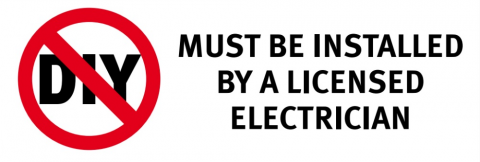Don’t do your own electrical work

Times when it’s ok to DIY Fail – trying to fix a wonky table or hanging up a shelf incorrectly … times when it’s not – DIY electrical work.
Our electrical safety campaign, DDIY – Don’t Do It Yourself, aims to prevent fatality and serious injury of Queenslander DIY-ers by communicating the dire consequences of DIY electrical work, and the importance of always using a licensed professional.
It may be tempting to consider saving some money, or you might think it seems simple enough to DIY electrical work, unless you are qualified and trained there are lots of risks you just won’t know about, and it’s not worth risking your life.
Whether that’s installing a light switch or power point, replacing a light fitting with a ceiling fan, repairing electrical equipment, constructing an extension lead or replacing a plug on the end of an extension lead, you should always use a licensed electrician.
Check your electrician is licensed by using our Electrical Licence Search – never DIY electrical work. It’s not worth risking your life.
Download our DDIY campaign communication kit for key messages, social media posts for sharing and helpful links.
Use a licensed electrician
Always get a licensed electrician to do any electrical work.
When choosing one, always look for their electrical contractor licence number and confirm that it’s current before agreeing to any work. You can check the status of electrical contractor licence numbers through our Electrical Licence Search
If you can’t find your electrician in the database, call us on 1300 362 128.
The Queensland Government would like to thank and acknowledge Energy Safe Victoria (Victorian Government) for the use and adaptation of the original DDIY campaign concept.
What is electrical work?
Under section 18 of the Electrical Safety Act 2002 (the Act), electrical work includes "the manufacturing, constructing, installing, testing, maintaining, repairing, altering, removing, or replacing of electrical equipment".
This covers tasks like:
- installing a new power point
- replacing a light switch
- replacing a batten holder with a new light fitting
- repairing an electrical appliance like a heater
- altering the location of an existing power point
- replacing a light fitting with a ceiling fan
- constructing an extension lead
- replacing a plug on the end of an extension lead.
It’s not illegal to purchase electrical accessories or appliances that need to be hard-wired, but they must be connected by a licensed electrician.
Other work such as replacing a drive belt in a washing machine, cutting openings for air-conditioning units or fitting, but not connecting, an electric wall oven in a kitchen cabinet are not regarded as electrical work. However, electrical risks such as damage to, or contact with, wiring contained within wall cavities need to be considered and controlled, particularly when cutting holes or driving screws or nails into walls.
What can happen if I do my own electrical work?
In Queensland, electrical safety inspectors investigate and prosecute unlicensed work.
Aside from being illegal, people who perform unlicensed and DIY electrical work risk contact with electricity, which can have deadly consequences for them as well as for the users or anyone else who comes into contact with the electrical installation or equipment which may accidentally be left in an unsafe state. This danger may not be immediately apparent and often only becomes evident in a fault situation, or may even develop over time.
Major property damage from an electrical fire is also a risk and if it was the result of illegal electrical work, your insurer may refuse the claim.
What are the penalties?
DIY electrical work is regarded as unlicensed electrical work, which is illegal, and has penalties of up to $40,000 for individuals.
A breach that exposes an individual to a risk of death or serious injury or illness attracts a maximum penalty of $600,000 for an individual ($3,000,000 for a corporation) or five years imprisonment.
Electrical licensing
A person who performs electrical work in Queensland must have an electrical work licence authorising the work. Licensed electrical workers are required by law to ensure electrical work is performed in accordance with legislative requirements and any applicable codes of practice and technical standards.
Businesses which provide electrical work services for others in Queensland must have an electrical contractor licence (the actual electrical work may be done by one of the contractor's licensed electrical workers).
Licensed electrical contractors are required to meet specific insurance requirements including having a minimum of $5 million public liability insurance, with a $50,000 consumer protection component.
Unlicensed and DIY electrical work does not provide this assurance or protection.
Report unlicensed or dangerous electrical work to the Electrical Safety Office.
Warning signs when purchasing electrical equipment
When purchasing electrical equipment, you might see a ‘Don’t DIY’ sign near it.

Business owners who sell certain types of electrical equipment to the public in Queensland, are required to display ‘Don’t DIY’ warning signs.
This applies to face-to-face as well as online selling but generally does not apply to garage sales, jumble sales, fêtes - unless a person sells at these events as part of a business.
More on electrical equipment.


